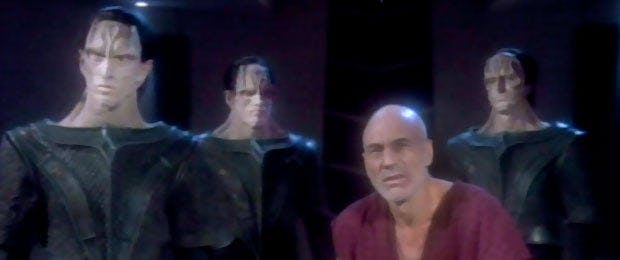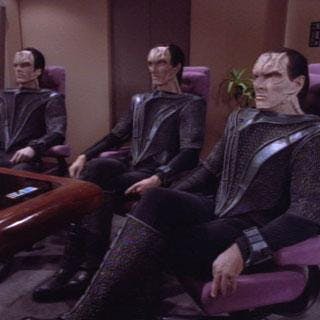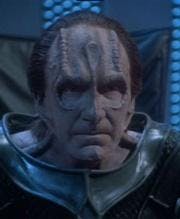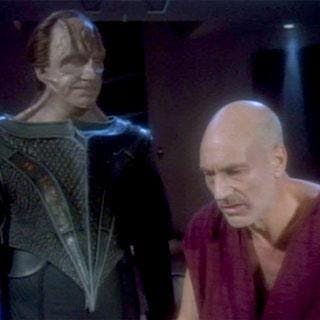Published Apr 23, 2012
There Are Four Lights - Free Will On TNG
There Are Four Lights - Free Will On TNG

The Calgary Comic & Entertainment Expo is fast approaching, with the event -- the centerpiece of which will be a reunion of the entire first-season Star Trek: The Next Generation cast -- set to be held from April 27-29 in Calgary, Alberta, Canada. As the big weekend nears, StarTrek.com thought readers might enjoy reading an insightful essay, "There Are Four Lights: Free Will in the Context of Star Trek: The Next Generation," by Calgary Expo staffer Lindsay Thomas. The essay is one of several that, along with TNG cast member interviews, will be included in a limited-edition (of 6,000), commemorative collector's program that will be available at the Calgary Expo.
There Are Four Lights: Free Will in the Context of Star Trek: The Next Generation
Hidden beneath the malevolence of the Borg Collective I always felt, what I can only describe to be, a disjointed sense of innocence. There was no fundamental free will, there was no morality or ethical reasoning; The Collective was merely doing what it was programmed to do – one might even say, it was simply succumbing to its intrinsic nature in the purist sense. The Borg was terrifying in its relentless pursuit – exhibiting no sympathy, no second thoughts, no potential for reasoning or negotiating, just cold industrialized space aged metal grating upon what was once warm, pulsing flesh. Up until the sixth season of TNG I had found the Borg, in its efficient approach to assimilating life, to be the most terrifying antagonist ever to appear on the show.

Captain Picard’s experience with the Cardassians was vastly different than his experience as Locutus. I found something particularly chilling about the idea that not only could your free will be taken away from you, you could willingly allow it to slip away given the proper nurturing circumstances.
The Borg, unlike the Cardassians, were not concerned with military secrets or brainwashing, it simply fed parasitically on other races, extracting their very identities. It had less to do with free will and more to do with the actual function of the species itself. You could almost exchange the words, “Resistance is futile” with, “It’s not personal, it’s just business.”

Lit up before the Captain were four lights. He counted them, he knew the truth, 2+2=4, a graceful nod to George Orwell’s 1984. The torture began and Gul Madred insisted there were five. Through starvation and manipulation and dehydration and humiliation, Gul Madred again questioned the Captain, insisting that the truth was other than what it was– that there were five lights. Finally, he resorted to promises of relief – of warmth and peace and solitude. Surely, surely the Captain must now see five lights?

Having watched TNG closely for the first six seasons, I found myself – for the first time – realizing just how susceptible our human Captain was to the violent seductions of other races. It was the first time that I felt any kind of despair in relation to the show, knowing that even the strongest of us can be broken. This translated into questions in my own mind – how much do I believe simply because it is the truth that is presented to me and how much of that truth is the factual reality? It was a cautionary tale, if you will, about asking questions and taking the time to think about my beliefs instead of simply relying on blind faith, cultural conditioning or other external factors to support these beliefs; a cautionary tale that reminds us of just how fragile and precarious life can truly be.
For additional Calgary Expo information and ticket details, click HERE. To follow the Calgary Expo on Twitter and Facebook, click HERE and HERE. And be sure to check StarTrek.com for additional news, interviews and event recaps.

